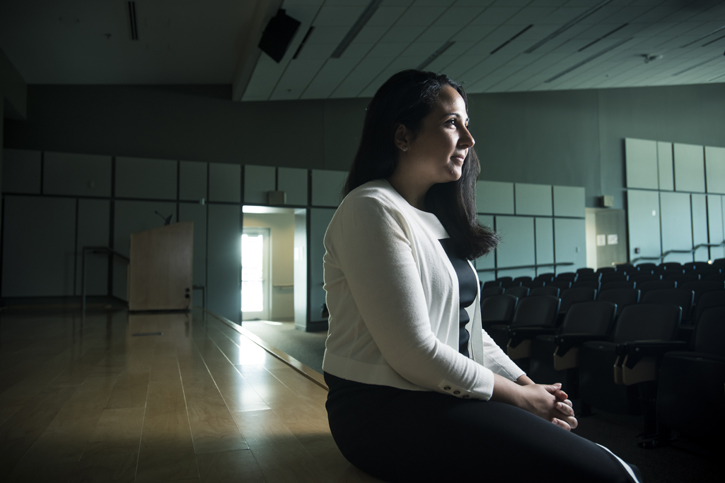
Mason alumna Aya Hijazi returned to Mason’s S-CAR this month for the first time this after spending three years in an Egyptian prison. Photo by Ron Aira.
“We went [to Cairo] as students trying to change the world,” said George Mason University alumna Aya Hijazi of her and her husband’s intentions. “My aim in life is to make the world more humane.”
Hijazi and her husband, Mohammed Hassanein, travelled to Egypt with their nongovernmental organization, Belady Foundation, which gave homeless children in Cairo a place to go during the day. They were arrested in May 2014 and charged with the very thing they were trying to prevent—human trafficking and child abuse.
“I was looking for justice, but sometimes the law is a barrier,” Hijazi said during a visit to Mason’s Arlington Campus in July.
Hijazi and Hassanein were released in April 2017 when the charges were dropped after months of negotiations between the Trump administration and the government of Egyptian president Abdel Fatah al-Sissi.
“‘Human trafficking’ in my case meant I took children to [anti-government] protests and paid them money,” said Hijazi, who graduated from Mason in 2010 with a BA in conflict analysis and resolution. “Or that I kidnapped them and hid them somewhere.... From the very beginning, it didn’t make sense.”
Hijazi said conditions in the prison were relatively good, a statement reflective of her School of Conflict Analysis and Resolution studies.
“One area where activists fail is give praise where praise should be given,” she said. “It was a relatively humane prison.”
The city police stations, on the other hand, “are where the beatings and torture happen.”
In welcoming Hijazi back to campus, S-CAR dean Kevin Avruch said she was the kind of student the school intended to educate.
“From the beginning, the notion was to create a school dedicated not to just turning out degrees, but turning out practitioners, people committed to social change,” he said.
Hijazi could have remained in the United States but returned to her native Egypt “as a patriot, with a love of Egypt and the children of Egypt,” Avruch said.
Mason professor Susan Hirsch recalled that when Hijazi was a student she expressed an interest in studying law. After exposure to conflict resolution, she said, Hijazi “set her sights on justice, not law…And after her long ordeal, she maintained her dignity and inspired others.”
These days Hijazi and Hassanein continue to work with their foundation and have incorporated Belady in the United States.
“Ideally we would have continued [working] in Egypt but we’re not going back,” she said. “Not at this time.”
